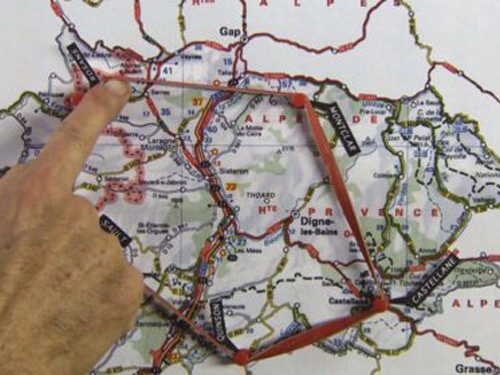
In a thinly-populated area in the Alps, the number of suicides and murders is extremely high. Luc Moullet explores the causes and consequences of these alarming actions. He travels to five villages that form a ‘pentagon of madness,’ and interviews inhabitants about the crimes of the past century.
EN
Notebook: Did you have that sort of trouble, going around the countryside talking to people about crimes that involved people who were still alive?
Luc Moullet: Yes, of course. There is a kind of “omertà” – an idiom of Naples – a kind of code of silence of the Mafia. And it exists, or at least a similar thing, particularly in the Southern Alps. So at first it was difficult to find people who could speak. Usually I could find one; though in one case a witness didn’t want to talk so I replaced him in the film with myself.
In the middle of the movie you say that there seems to be almost a “culture” of madness and crime in the area. I got the sense that a lot of the people you talked to enjoyed telling these horrible stories – that they seemed more like stories than local events people were personally involved in. It was almost like folklore they were relating to us.
Daniel Kasman and David Phelps in conversation with Luc Moullet1
“As Jean-Claude Biette said, naturalism is the identification of elemental life with humankind. Land of Madness’s in depth unification by the most primitive madness, that of cretinism, does not make the film naturalist, for cretinism here is on the order of esotericism. In the middle of the film, Moullet says: ‘President Chirac had a psychoid daughter, but President Sarkozy didn’t, so he reduced the money allotted to psychiatry.’ The audience laughs, it’s easy. Except that 20 minutes later, this dumb and mean laughter is upset by an even more troublesome laughter due to the revelation of Moullet’s failed suicide attempt from a bridge. Esotericism: the easiest hides the most difficult while accentuating madhouse bareness on the off-beat. Thus the viewer gradually understands – but never at the moment – that everything here resonates in the hidden setting of the self-portrait, even bile and death.”
Serge Bozon2
- 1Daniel Kasman and David Phelps, “A Rock is a Hard Place: An Interview with Luc Moullet”, MUBI Notebook, July 2009.
- 2Serge Bozon, “Exclusive Cahiers du Cinema Reviews in English: Serge Bozon on ‘Land of Madness’,” Indie Wire, February 2015.
FR
« À travers une suite d’entretiens, Luc Moullet élabore la cartographie de cette « terre de la folie » dont il est originaire. Avec le ton et l’humour qui lui sont propres, le cinéaste fait s’enchaîner les situations, les personnages. Le cinéma traverse de part en part cette enquête documentaire, du sol jonché de bobines de films dans le grenier familial, à l’évocation de King Vidor qui réussit à résoudre un crime grâce au tournage d’un de ses films. Moullet aimerait bien faire de même, mais il découvre qu’il est devenu le principal suspect de son enquête… »
Pascal Catheland1
- 1Pascal Catheland, Tënk Film Page.

